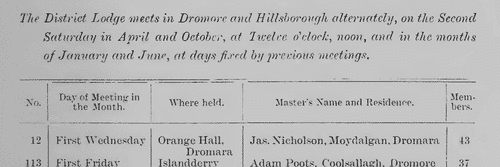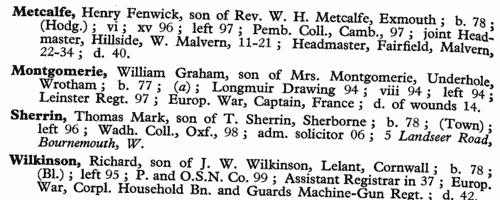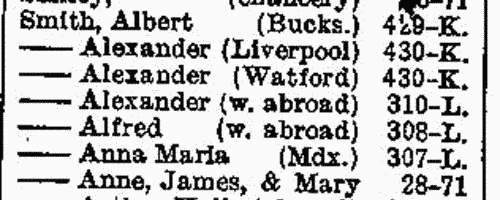Wylie Surname Ancestry ResultsOur indexes 1000-1999 include entries for the spelling 'wylie'. In the period you have requested, we have the following 411 records (displaying 281 to 290): Single Surname Subscription | | | Buying all 411 results of this search individually would cost £2,212.00. But you can have free access to all 411 records for a year, to view, to save and print, for £100. Save £2,112.00. More... |
These sample scans are from the original record. You will get scans of the full pages or articles where the surname you searched for has been found. Your web browser may prevent the sample windows from opening; in this case please change your browser settings to allow pop-up windows from this site. Indian Civil Servants
(1904)
The India List and India Office List was compiled from official records by direction of the Secretary of State for India in Council, and published by the India Office annually. The volume for 1905 includes this Record of Services, corrected to 1 July 1904. It includes Officers of the Home Establishment of the Secretary of State, Officers of the Covenanted Civil Service, and those appointed under the Native Civil Service Rules, other Officers in Civil Employment in India whose substantive pay was at least 1000 rupees a month, and, with a few exceptions, all officers of those classes who had retired since 1886.WYLIE. Cost: £4.00.  | Sample scan, click to enlarge

| Loughbrickland District Orange Lodge Masters (1904)
The annual report of the County Down Grand Orange Lodge includes district returns listing the separate constituent lodges, giving number, day of meeting in the month; where held; the master's name and residence; and number of members.
WYLIE. Cost: £8.00.  | Sample scan, click to enlarge

| Ordinary Members of the Institute of Bankers
(1904)
The Journal of the Institute of Bankers for 1904 includes a list of Fellows (from which this scan is taken: an asterisk indicates a Life Fellow), of Associates (an asterisk indicates a Life Associate, and a dagger a holder of the certificate of the institute), and of Ordinary Members; there are also results of the institute's final examinations held from 11 to 13 April, in which the successful candidates are listed alphabetically by surname and full christian name(s), with the name and address of their bank (not their personal addresses). These final examinations entitled the successful candidates to the Certificate of the Institute of Bankers; those who obtained distinctions are so indicated in the lists (an asterisk for Commercial Law, dagger for Arithmetic and Algebra, double dagger for Practical Banking, double s for Commercial Geography and History, and double vertical line for Political Economy). There was also an examination taken after the Gilbart Lectures, with successful candidates being awarded money prizes, or certificates of distinction, or honour, or merit, and similar lists of these awards were also printed in the journal.WYLIE. Cost: £6.00.  | Sample scan, click to enlarge

| Students awarded the Certificate of the Institute of Bankers
(1904)
The Journal of the Institute of Bankers for 1904 includes a list of Fellows (from which this scan is taken: an asterisk indicates a Life Fellow), of Associates (an asterisk indicates a Life Associate, and a dagger a holder of the certificate of the institute), and of Ordinary Members; there are also results of the institute's final examinations held from 11 to 13 April, in which the successful candidates are listed alphabetically by surname and full christian name(s), with the name and address of their bank (not their personal addresses). These final examinations entitled the successful candidates to the Certificate of the Institute of Bankers; those who obtained distinctions are so indicated in the lists (an asterisk for Commercial Law, dagger for Arithmetic and Algebra, double dagger for Practical Banking, double s for Commercial Geography and History, and double vertical line for Political Economy). There was also an examination taken after the Gilbart Lectures, with successful candidates being awarded money prizes, or certificates of distinction, or honour, or merit, and similar lists of these awards were also printed in the journal.WYLIE. Cost: £6.00.  | Sample scan, click to enlarge

|  Queen's South Africa Medal: Royal Field Artillery: 2nd Battery
(1901-1905) Queen's South Africa Medal: Royal Field Artillery: 2nd Battery
(1901-1905)
The nominal roll for the Queen Victoria's South Africa Medal - awarded (after her death, in the event) to all who had served honourably in the various campaigns in the Boer War - was compiled from these returns from the individual units. Two sets of form were completed. The main one, as in the sample scan, dates from 1901 and gives regimental number, rank, and full name (surname first), followed by a series of columns relating to different actions - Belmont, Modder River, Paardeberg, Dreifontein, Wepener, Johannesburg, Diamond Hill, Belfast, Wittebergen, Defence of Kimberley, Relief of Kimberley, Defence of Mafeking, Relief of Mafeking, Cape Colony, Orange Free State, Transvaal, Rhodesia, Talana, Elandslaagte, Tugela Heights, Defence of Ladysmith, Relief of Ladysmith, Laing's Nek, and Natal; each entitled the man to a separate clasp to the medal, and a tick or a Yes in the appropriate column indicates the man's actual physical presence in that battle. A final column for remarks is important in those cases where the man was no longer in the unit, by removal, death or desertion. The second form that sometimes occurs was returned in 1905, and covers men entitled to the Second South African War Medal and Clasps. It lists men by number, rank and name, checks whether they had claimed the Queen's South Africa Medal, and then enquires as to their suitability as to three Colony Clasps, which could be awarded for service in the Cape, Orange Free, or Transvaal; whether entitled to Date Clasps (South Africa 1901 and South Africa 1902); whether also entitled to the King's South Africa Medal; any other corps in which served in South Africa; and remarks (such as becoming non-effective, forfeiture, &c.) WO 100/140WYLIE. Cost: £8.00.  | Sample scan, click to enlarge

|  Queen's South Africa Medal: Royal Field Artillery: 38th Battery
(1901-1905) Queen's South Africa Medal: Royal Field Artillery: 38th Battery
(1901-1905)
The nominal roll for the Queen Victoria's South Africa Medal - awarded (after her death, in the event) to all who had served honourably in the various campaigns in the Boer War - was compiled from these returns from the individual units. Two sets of form were completed. The main one, as in the sample scan, dates from 1901 and gives regimental number, rank, and full name (surname first), followed by a series of columns relating to different actions - Belmont, Modder River, Paardeberg, Dreifontein, Wepener, Johannesburg, Diamond Hill, Belfast, Wittebergen, Defence of Kimberley, Relief of Kimberley, Defence of Mafeking, Relief of Mafeking, Cape Colony, Orange Free State, Transvaal, Rhodesia, Talana, Elandslaagte, Tugela Heights, Defence of Ladysmith, Relief of Ladysmith, Laing's Nek, and Natal; each entitled the man to a separate clasp to the medal, and a tick or a Yes in the appropriate column indicates the man's actual physical presence in that battle. A final column for remarks is important in those cases where the man was no longer in the unit, by removal, death or desertion. The second form that sometimes occurs was returned in 1905, and covers men entitled to the Second South African War Medal and Clasps. It lists men by number, rank and name, checks whether they had claimed the Queen's South Africa Medal, and then enquires as to their suitability as to three Colony Clasps, which could be awarded for service in the Cape, Orange Free, or Transvaal; whether entitled to Date Clasps (South Africa 1901 and South Africa 1902); whether also entitled to the King's South Africa Medal; any other corps in which served in South Africa; and remarks (such as becoming non-effective, forfeiture, &c.) WO 100/141WYLIE. Cost: £8.00.  | Sample scan, click to enlarge

|  Queen's South Africa Medal: Royal Horse Artillery: G Battery
(1901-1905) Queen's South Africa Medal: Royal Horse Artillery: G Battery
(1901-1905)
The nominal roll for the Queen Victoria's South Africa Medal - awarded (after her death, in the event) to all who had served honourably in the various campaigns in the Boer War - was compiled from these returns from the individual units. Two sets of form were completed. The main one, as in the sample scan, dates from 1901 and gives regimental number, rank, and full name (surname first), followed by a series of columns relating to different actions - Belmont, Modder River, Paardeberg, Dreifontein, Wepener, Johannesburg, Diamond Hill, Belfast, Wittebergen, Defence of Kimberley, Relief of Kimberley, Defence of Mafeking, Relief of Mafeking, Cape Colony, Orange Free State, Transvaal, Rhodesia, Talana, Elandslaagte, Tugela Heights, Defence of Ladysmith, Relief of Ladysmith, Laing's Nek, and Natal; each entitled the man to a separate clasp to the medal, and a tick or a Yes in the appropriate column indicates the man's actual physical presence in that battle. A final column for remarks is important in those cases where the man was no longer in the unit, by removal, death or desertion. The second form that sometimes occurs was returned in 1905, and covers men entitled to the Second South African War Medal and Clasps. It lists men by number, rank and name, checks whether they had claimed the Queen's South Africa Medal, and then enquires as to their suitability as to three Colony Clasps, which could be awarded for service in the Cape, Orange Free, or Transvaal; whether entitled to Date Clasps (South Africa 1901 and South Africa 1902); whether also entitled to the King's South Africa Medal; any other corps in which served in South Africa; and remarks (such as becoming non-effective, forfeiture, &c.) WO 100/139WYLIE. Cost: £8.00.  | Sample scan, click to enlarge

| Boys entering Sherborne School
(1905)
The grammar school at Sherborne in Dorset, which doubtless existed from the creation of the diocese of Sherborne in 705, was refounded by king Edward VI in 1550. At the quatercentenary in 1950, a fourth edition of the Sherborne Register was published, listing boys entering the school during those four centuries. In truth, the materials for this register survive but fitfully before 1823; for some years, no names are known; sometimes all that is known is a surname. But from 1823 onwards the lists and the details get steadily more comprehensive. By the 20th century the boys are listed alphabetically by surname under term of entrance. Surname is given in bold, then christian names, name of father (surname and initials) and address; year of birth; house (a, School House; b, Abbey House; c, The Green; d, Harper House (formerly The Retreat); f, Abbeylands; g, Lyon House; h, Westcott House); whether represented the school at cricket (xi), football (xv), shooting (viii), &c.; year of leaving; summary of degrees, career &c.; and (in italics), address as of 1950. Names in the early lists marked with an asterisk are found inscribed on the oak panelling or on the stone walls of the former schoolroom. (F) in the lists indicates a foundationer, receiving free education: after 1827, when this privilege was restricted to boys from Sherborne and neighbourhood, nearly all foundationers were day-boys.WYLIE. Cost: £4.00.  | Sample scan, click to enlarge

| Missing Next-of-Kin and Heirs-at-Law
(1905)
The Unclaimed Money Registry and Next-of-Kin Advertisement Office of F. H. Dougal & Co., on the Strand in London, published a comprehensive 'Index to Advertisements for Next of Kin, Heirs at Law, Legatees, &c., &c., who have been Advertised for to Claim Money and Property in Great Britain and all Parts of the World; also Annuitants, Shareholders, Intestates, Testators, Missing Friends, Creditors or their Representatives, Claimants, Unclaimed and Reclaimed Dividends and Stock, Citations, Administrations, Rewards for Certificates, Wills, Advertisements, &c., Claims, Unclaimed Balances, Packages, Addresses, Parish Clerks' Notices, Foreign Intestates, &c., &c.' The original list was compiled about 1880, but from materials dating back even into the 18th century: most of the references belong to 1850 to 1880. For each entry only a name is given, sometimes with a placename added in brackets: there may be a reference number, but there is no key by which the original advertisement may be traced. The enquirer of the time had to remit £1 for a 'Full and Authentic Copy of the Original Advertisement, together with name and date of newspaper in which the same appeared'. This appendix to the list was issued in about 1905.WYLIE. Cost: £4.00.  | Sample scan, click to enlarge

| Star of India
(1905)
The India List and India Office List was compiled from official records by direction of the Secretary of State for India in Council, and published by the India Office annually. The 1905 edition includes this list of living recipients of The Most Exalted Order of the Star of India, instituted in 1861 - Grand Commanders (G. C. S. I.), Knights Commanders (K. C. S. I.) and Companions (C. S. I.).WYLIE. Cost: £4.00.  | Sample scan, click to enlarge

|
Research your ancestry, family history, genealogy and one-name study by direct access to original records and archives indexed by surname.
|













